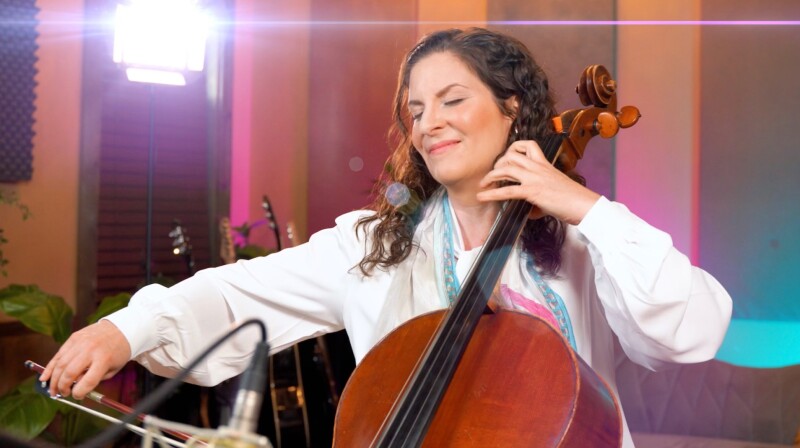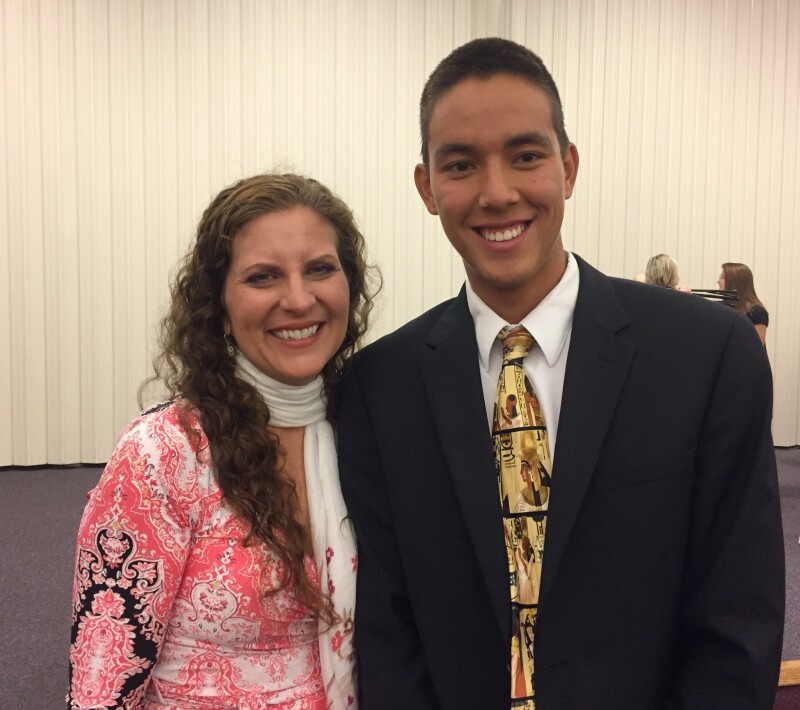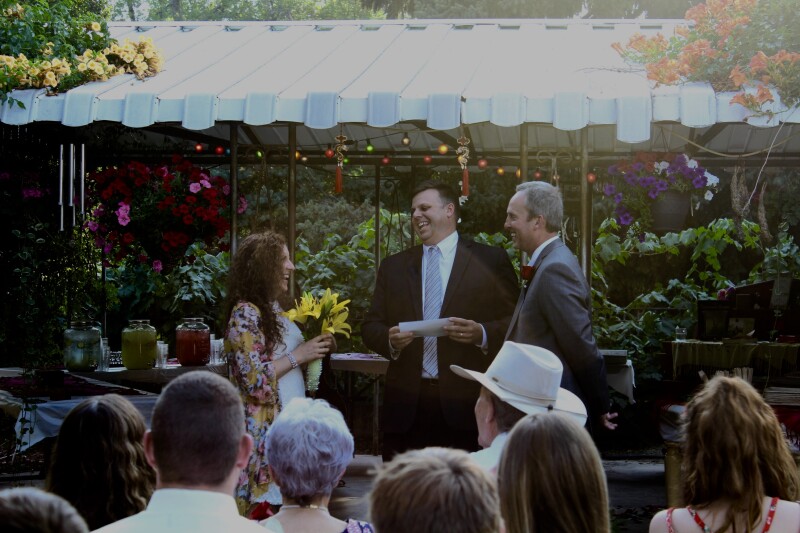
Nicole Pinnell woke up to sun streaming through her window. On any other Sunday morning, that may have been a pleasant awakening. But not today.
Her eyes darted to the clock, and she sat up with a start—it was already 8:50 a.m. Church was starting in just 10 minutes, and for the first time in over 20 years, Nicole had decided she wanted to be there.
So she jumped out of bed and hurried downstairs to put on the dress she’d dug out from the back of her closet last night, only to find it ripped up by her parrot, who somehow escaped his cage. Racing back to her closet, she scrambled to find something else to wear.
She then went to the bathroom to quickly brush her teeth. As she did, she felt a darkness coming over her, as if clouds were gathering around the house. Her parrot began to squawk and her dog to bark. Frightened, Nicole quickly left the house, toothbrush still in her mouth. She started running to the church building just down the street, eventually throwing her toothbrush onto an unsuspecting lawn.
This morning was not going how she’d pictured it would. Late. Spitting out toothpaste as she ran, hair undone, and not a spot of makeup on her face. Nicole simply had to come as she was.
She made it to the church building, threw the door open, and then nearly slammed it shut behind her. As soon as she did, the darkness she’d felt gathering immediately dispersed and was replaced by tender peace.
Embarrassed by the ruckus she’d created coming in, Nicole forgot all about her plan to sit in the back where no one would notice her. Instead, without thinking about it, she walked straight to the left side to the third row of pews—right where she’d always sat with her parents when she was a child.
Then she looked up. To her astonishment, President Dallin H. Oaks was sitting on the stand, just feet from her third-pew seat. This day in a very normal, unassuming chapel would soon “change everything,” as Nicole says.
But to understand the full, beautiful picture of that Sabbath morning, we must turn back the pages to years and years ago. Because Nicole’s transformation does not start and end with church—it starts and ends with Christ.
Reasons for Leaving
Nicole grew up with dedicated Latter-day Saint parents in Wisconsin. She has spiritual memories of listening to President Spencer W. Kimball’s distinct voice and creating a garden with her mother, per the prophet’s iconic instruction. As she entered adulthood, however, her testimony would be slowly torn apart.
She began to deeply question the spiritual experiences she’d had growing up—was that only a manipulation of emotions? she wondered. Confused, Nicole began to put more of her trust in what could be seen and proved.
Then, a loved one became “engulfed” in literature aimed at undermining a testimony of the Church. In an effort to prove this person wrong, she dove in too.
“I’d had such a complete trust in my testimony and in the Church [before],” she says. “I didn’t realize that by leaving safe water I was jumping into a slippery slope that had a long and tragic descent.”
Now instead of prophets, her mind was filled with the voices of those who wanted to tear down the framework of Christ’s church. And she began to believe them. She also was increasingly troubled by the Church’s stance on marriage being only between a man and a woman.
So in her early twenties, Nicole firmly decided to leave the faith of her childhood—with no intention of ever looking back.
Reasons for Returning
Nicole went on to become a world-class cellist. She has been featured around the world in hundreds of scores for film and radio and performed as a soloist on three Grammy-nominated albums.
In late 2013, she was hired by the Church to record a song about Jesus Christ. At this point, Nicole was actively practicing Buddhism and believed in reincarnation. So she decided to ask if Jesus’s soul could come and help her play this song about Him. She went into the bathroom for privacy, where she knelt on a light-pink shag rug and asked Jesus for His help.
“Right away, a warm feeling started to blossom in my chest. Quickly, it got stronger, and tears came to my eyes. Jesus was a man who I could feel had so much love! I left the bathroom and poured His love into my cello,” Nicole later wrote.
The song she was hired to play? “Come Unto Christ.” After that experience, Nicole began to notice a new, loving presence occasionally lingering in her heart.
The next year, she was honored to be selected to study with Yo-Yo Ma’s Silk Road global musician project. There she studied sacred music from some of the finest musicians in the world, including musicians from Hindustani, Arabic, and African traditions.
“Those were very important experiences, although to some I think they seemed very strange,” Nicole says. “But actually, what I was experiencing was a different way of connecting with the divine.”
As part of her studies, she worked with a West African djeli, a man who is a storyteller and keeper of oral history. He taught her about the music of his ancestors and encouraged Nicole to find the music of hers as well. So she began to seek for connection with non-living family members. “And how does one do that?” Nicole says. “By cultivating and trusting that there’s an inner world that you can access … . I started trusting the experiences I was having inside of my mind and heart.”

With her heart now open to things not seen, but true, Nicole became more interested in exploring the connection she’d felt to Jesus. She began to think more about Him, reach out to Him in her heart, and learn about His mortal life.
This was a process that went on for years, during which she chose not to focus on whether she’d ever be re-baptized into the Church—this was just about a relationship with Jesus. With time, her heart began to open not just to Jesus of Nazareth, but to Jesus the Christ.
“But after a time, it was clear that in that transformation, I had plateaued. I wanted more,” she says.
In late 2016, Nicole’s life took a serious turn for the worse. She experienced major health problems and was betrayed by someone she trusted, leaving her in financial ruin. Internally she felt totally defeated.
“I began to seek in earnest for peace and hope,” she says.
One of the first things she did, in early 2017, was start gardening again, just as she had done with her loving mother. So even though it was February, and the ground was cold and hard, Nicole was outside each morning with her shovel pulling weeds.
And as she did, she began to hear President Kimball’s distinct voice whisper in her mind and heart.
“It’s funny because I felt so comforted, [even though] I certainly did not believe in modern prophets,” she says, adding that the song “God Bless Our Prophet Dear” began to ring in her head.
A few months later, her friend Sue, who was the mother of one of Nicole’s cello students, asked if she could talk to Nicole about the Church. Nicole was startled. She’d known this woman for seven years and they’d never discussed religion. Interested but unsure, Nicole agreed. So Sue and her son Paul, who would soon be leaving on a mission, began teaching Nicole the gospel of Jesus Christ.
With time, Nicole decided she could consider rejoining the Church if she conquered three doctrinal hurdles: (1) Was the Book of Mormon true? (2) Was Joseph Smith a prophet? (3) Were there modern-day prophets?
The answer to her first question came slowly. She’d started tentatively reading the Book of Mormon even before Sue approached her, but after spending much of her adult life reading what other people had to say against the Book of Mormon, she found reading it very frustrating. But at the invitations of Paul, her dedicated cello student, she renewed her effort.
Then one night, after months, she remembered an approach her dad had taught her as a child: instead of reading chronologically, she opened to a page at random. Her eyes fell to Mosiah 4:6–8, and as she read the verses, she knew.
“Most of the time, we get our testimonies in bits and pieces. Growth can be so subtle that it is almost impossible to detect. But sometimes, a testimony grows in one moment. And this was my moment,” she says.
The answer to her next question, Was Joseph Smith a prophet?, came quickly through a feeling. “It shocks me to this day how quick,” Nicole says. The feeling in her heart that Joseph was a prophet was strong enough to overlook all the negativity she’d read about him for years.
Now all that was left was the question of modern prophets—a question Nicole felt she had to have answered before she could go to church. But as difficulties continued to swirl in her life, she decided to give church a try. No commitments. No promises.
So she dug to the back of her closet, laid out a dress, and went to bed. The next morning would start chaotically, but it would culminate with her sitting just feet away from a living prophet.
Returned
When Nicole looked up and saw President Oaks on the stand, her instinct was to slink down in her seat—not because she was embarrassed, but because she knew President Oaks personally from performing with his daughter, violinist Jenny Oaks Baker, and she didn’t want him to recognize her.
The meeting began, and, while Nicole enjoyed it, she wasn’t “drawn in.” Then President Oaks stood to talk.
“He said, ‘Is the Church true? So many people ask that question. But it’s not the important question. The important question is, Is the gospel of Jesus Christ true?’” Nicole remembers, her voice filling with emotion at the memory.
Here was a man Nicole was wary of for a few reasons: she questioned if only men could be prophets, and for years she’d watched videos of people tearing down leaders of the Church, including President Oaks. But here he was standing in front of her, answering what was really the deep question of her heart.
“There was a point in the talk that I felt like I saw President Oaks go from being a man with index cards and glasses to where I could hear his voice differently in my mind—like the voice of rushing waters. I was able to see the voice of God come through this man that I was very suspicious of.”
Nicole’s plan had been to leave as soon as sacrament meeting was over, but she quickly canceled her afternoon cello lessons so she could attend the entire three-hour block. In Sunday School, she was surprised by the discussion: She’d come to believe members of the Church were all the same. But this group had very different opinions, and they weren’t afraid to share them.
“It was really interesting and beautiful,” she recalls.
Then in Relief Society, the lesson was on relying on Christ through hard times. Nicole was amazed as women stood up and bravely shared the difficulties in their lives.
“My perception was that Latter-day Saints pretended that everything was easy and that everyone could be happy all the time. This was not happening in that meeting—at all. These women were honest, open, and sincere, they were talking that way in front of an Apostle!” Nicole says, as President Oaks had slipped in the back.
The teacher then opened the meeting for testimonies. And to her complete surprise, Nicole felt strongly that she should stand up. Her plan for the day was to slip in and out of sacrament meeting unnoticed, no commitment.
“But I got up,” she says. “I told everyone who I was. And I said that I came today because I was thinking about coming back to church, and that I’d received my answer. Then I committed myself to baptism—in front of my entire Relief Society and President Oaks.”

At Home
Nicole was rebaptized on August 20, 2017, about six weeks after that chaotic morning getting to church. Those six weeks were filled with numerous challenges, but with loving, encompassing support from her parents, missionaries, ward members, and friends, Nicole was ready for her baptism—she invited “pretty much everyone” and prepared a 25-piece cello choir.
“When I started walking into the water, I remember thinking, ‘This is not what my baptism water felt like when I was a child,’ which makes sense; a whole lot had happened between my eight-year-old baptism and my 40-something-year-old baptism. But that water felt like walking into love,” Nicole remembers.
Her cello student Paul was the one to perform the ordinance.

Nicole’s bishop at the time was Dan Going, someone she now considers a dear friend. Dan is grateful for what he’s learned about the Savior through his friendship with Nicole.
“Christ is there to forgive sins; He’s not here to punish and demoralize us, but to uplift and to welcome wholeheartedly, and that should be our job as well,” he says. “Not to make people suffer for choices they made years ago, but to celebrate the choices they’re making now—the good choices they’re making against all odds.”
Dan also says he loved to watch how Nicole “blossomed” as a person and as a disciple of Christ after her baptism. She would later meet Bryce McClure, and the two were sealed in the temple in 2019.
“Her commitment to the gospel, and to answering her Father’s call to come home … inspires me to be the person I want to be, and should be, and love being. She makes my life better every day,” says Bryce.

Nicole’s joyful focus now is deepening her relationship with the Savior, a relationship that began anew all those years ago as she knelt on a shag rug in a bathroom.
“I experience love in a different way than I used to,” she says. “The connections that we make through our covenants with Christ I feel have physically changed my body to experience love with such depth and breadth.”
To those parents, friends, or leaders who may be worried about someone they love who has stepped off the path, Nicole would encourage you to do what her parents did: “The best thing you can do is to love them as they are and keep them close. My parents respected my agency and lived joyfully by my side. Be the love that you want them to feel; be the light that you want them to see. Trust the Savior and understand that He will bring your loved ones home.”

▶ You may also like: Your job isn’t to be perfect. It’s to stay close to the One who can perfect you

